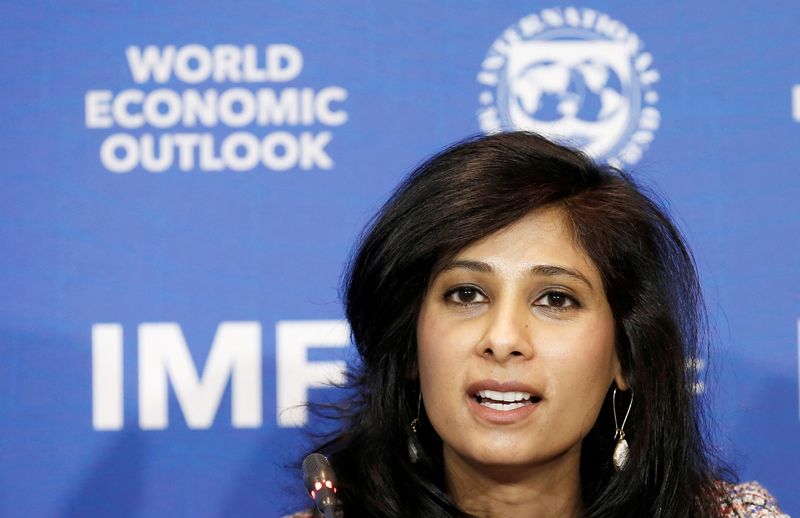By Howard Schneider
JACKSON HOLE, Wyo. (Reuters) - The tradeoffs facing global central bankers - between jobs, inflation and growth - are likely to get worse in coming years as the world struggles to right job markets and supply chains, and price pressures continue, Gita Gopinath, the International Monetary Fund's first deputy managing director, told global policymakers on Friday.
Given the risks of inflation becoming embedded, Gopinath said top central banks will need to be uniformly tough despite the possible costs.
"Central banks must act decisively to bring inflation back to target and anchor inflation expectations," she told the Jackson Hole central banking conference in Wyoming.
Her remarks are part of what has become a rapid reset in how central bankers are approaching their jobs, with many facing rapid price hikes for the first time in their careers.
Policy approaches that seemed justified even a few months ago, such as running a "hot" economy to boost jobs and assuming that supply shocks would disappear, no longer seem safe, Gopinath said.
"The pandemic and (Ukraine) war have served as 'stress tests' for countries' monetary policy frameworks," Gopinath said.
If past practice was to "look through" supply problems on the assumption that businesses would adjust, "the pandemic and war suggest that temporary supply shocks may have broader and more persistent effects on inflation when an economy is very strong, or the shocks are very large. Under such conditions, central banks may need to react more aggressively to control inflation," she said.
Similarly, efforts to use loose monetary policy to get stronger job gains, "creates significant inflation risk," Gopinath said. "Inflation pressures may become much more intense as unemployment declines to low levels, and key sectors face supply constraints. Difficulties measuring economic slack make it hard to tell exactly when inflation will hit, but the risks get significantly higher in a hot economy."
'HARDER TO PREDICT'
Gopinath's remarks reflect the urgent effort still underway among global central banks and economic institutions to understand the current outbreak of inflation and determine if it is rooted in permanent changes to the economy triggered by the pandemic and the Russian invasion of Ukraine.
The Fed only two years ago, for example, reworked its monetary policy to put more emphasis on job gains, and a willingness to take more risk with higher inflation.
That approach was based on a weak relationship between jobs and inflation that appeared valid in the years before the pandemic, but may now have changed.

As with other parts of the supply chain, the supply of workers may have grown more sluggish and inflationary.
"The number of workers, especially in high contact sectors, may become much harder to predict in light of pandemic changes," Gopinath said. "Goods and services provided through global value chains could become more expensive or unavailable if countries severely restrict trade."